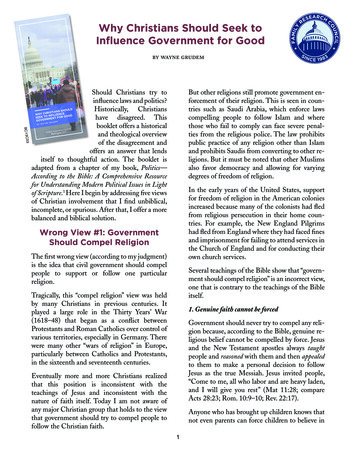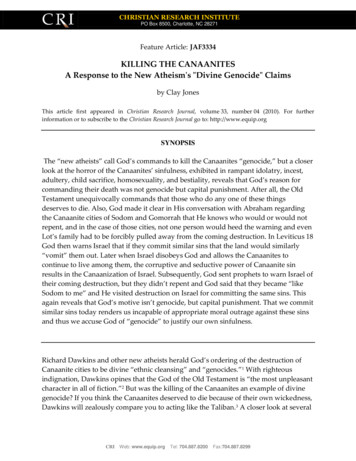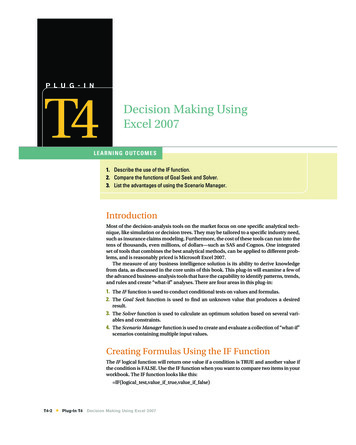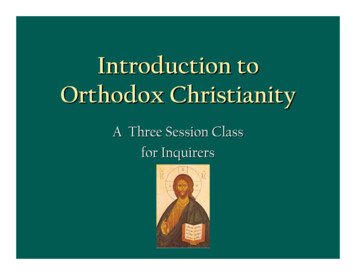
Transcription
Why Christians Should Seek toInfluence Government for Goodby wayne grudemBC13C03Should Christians try toinfluence laws and politics?Historically, Christianshave disagreed. Thisbooklet offers a historicaland theological overviewof the disagreement andoffers an answer that lendsitself to thoughtful action. The booklet isadapted from a chapter of my book, Politics—According to the Bible: A Comprehensive Resourcefor Understanding Modern Political Issues in Lightof Scripture.1 Here I begin by addressing five viewsof Christian involvement that I find unbiblical,incomplete, or spurious. After that, I offer a morebalanced and biblical solution.But other religions still promote government enforcement of their religion. This is seen in countries such as Saudi Arabia, which enforce lawscompelling people to follow Islam and wherethose who fail to comply can face severe penalties from the religious police. The law prohibitspublic practice of any religion other than Islamand prohibits Saudis from converting to other religions. But it must be noted that other Muslimsalso favor democracy and allowing for varyingdegrees of freedom of religion.In the early years of the United States, supportfor freedom of religion in the American coloniesincreased because many of the colonists had fledfrom religious persecution in their home countries. For example, the New England Pilgrimshad fled from England where they had faced finesand imprisonment for failing to attend services inthe Church of England and for conducting theirown church services.Wrong View #1: GovernmentShould Compel ReligionThe first wrong view (according to my judgment)is the idea that civil government should compelpeople to support or follow one particularreligion.Several teachings of the Bible show that “government should compel religion” is an incorrect view,one that is contrary to the teachings of the Bibleitself.Tragically, this “compel religion” view was heldby many Christians in previous centuries. Itplayed a large role in the Thirty Years’ War(1618–48) that began as a conflict betweenProtestants and Roman Catholics over control ofvarious territories, especially in Germany. Therewere many other “wars of religion” in Europe,particularly between Catholics and Protestants,in the sixteenth and seventeenth centuries.1. Genuine faith cannot be forcedGovernment should never try to compel any religion because, according to the Bible, genuine religious belief cannot be compelled by force. Jesusand the New Testament apostles always taughtpeople and reasoned with them and then appealedto them to make a personal decision to followJesus as the true Messiah. Jesus invited people,“Come to me, all who labor and are heavy laden,and I will give you rest” (Mat 11:28; compareActs 28:23; Rom. 10:9–10; Rev. 22:17).Eventually more and more Christians realizedthat this position is inconsistent with theteachings of Jesus and inconsistent with thenature of faith itself. Today I am not aware ofany major Christian group that holds to the viewthat government should try to compel people tofollow the Christian faith.Anyone who has brought up children knows thatnot even parents can force children to believe in1
God. You can bring them to church and you canteach them the Bible, but each child must makea personal decision to trust in Jesus as his or herown Lord and Savior. Genuine faith cannot beforced.cance for the history of the world. It signaled adifferent system from the nation of Israel in theOld Testament, where everybody in the nationwas considered a part of the people of God andthey all had to obey the religious laws.Someone might object, “But what about laws inthe Old Testament that ordered severe punishments for anyone who tried to teach another religion (see Deut. 13:6–11)? Wasn’t that part ofthe Bible?”3. Freedom of religion is a biblical valueJesus’ new teaching that the realms of “God” and“Caesar” are distinct implies freedom of religion.It implies that all civil governments—even today—should give people freedom regarding thereligious faith they follow (or don’t follow), andregarding the religious doctrines they hold, andhow they worship God. “Caesar” should not control such things, for they are “the things that areGod’s.”The answer is that those laws were only for thenation of Israel for that particular time. They werenever imposed on any of the surrounding nations.Such Old Testament laws enforcing religion werenever intended for people after Jesus came andestablished his “new covenant” (Heb. 8:8-9:28).Therefore Christians in every nation should support freedom of religion and oppose any attemptby government to compel any single religion. Infact, complete freedom of religion should be the firstprinciple advocated and defended by Christianswho seek to influence government.2. Jesus distinguished the realms of God and ofCaesarAnother biblical argument against the “compelreligion” view comes from Jesus’ teachings aboutGod and Caesar. Jesus’ Jewish opponents weretrying to trap him with the question, “Is it lawfulto pay taxes to Caesar, or not?” (Matt. 22:18). Taking his opponents by surprise, Jesus said, “Showme the coin for the tax,” and “they brought hima denarius” (v. 19). Jesus said to them, “Whoselikeness and inscription is this?” They said, “Caesar’s.” Then he said to them, “Therefore render toCaesar the things that are Caesar’s, and to Godthe things that are God’s” (Matt. 22:20–21).Wrong View #2: GovernmentShould Exclude ReligionThe opposite error from the “compel religion”view is “exclude religion.” This is the view thatsays we should completely exclude religion fromgovernment and politics. According to this view,religious beliefs should never be mentionedin governmental functions or on governmentproperty and should never play a role in decisionmaking processes in politics or government.This is a remarkable statement because Jesusshows that there are to be two different spheres ofinfluence, one for the government and one for thereligious life of the people of God. Some things,such as taxes, belong to the civil government (“thethings that are Caesar’s”), and this implies thatthe church should not try to control these things.On the other hand, some things belong to people’s religious life (“the things that are God’s”),and this implies that the civil government shouldnot try to control those things.This is the view promoted today by the American Civil Liberties Union (ACLU). Accordingto it, religious belief should be kept at home andquiet. There should be no influence from religious groups in the political process.Examples of this view are seen when people object to prayers being given at the beginning ofa city council meeting, or when groups demandthat the Ten Commandments be removed frompublic places. Supporters of this view seek toprohibit religious expression in high schools,student-led Bible studies, prayers before sportingJesus did not specify any list of things that belong to each category, but the mere distinctionof these two categories had monumental signifi2
events, or even a valedictorian talking about hisor her faith at graduation.This is hardly “excluding religion” from government or important government publications.1. It changes freedom of religion into freedom fromreligionThe First Amendment to the Constitution likewise declared: “Congress shall make no law respecting an establishment of religion, or prohibitingthe free exercise thereof; or abridging the freedomof speech.” What they meant by “an establishment of religion” was an established state church,a government-sponsored or government-endorsed denomination or specific religion. Butthey did not intend this amendment to excludeall religious speech and activity from governmentbuildings and activities, for our nation’s early political leaders continued praying publicly to Godat government events, even having church services in the Capitol for many years.The “exclude religion” stance is wrong from aconstitutional viewpoint, because it twists thepositive ideal of “freedom of religion” to mean“freedom from all religious influence”—which isentirely different and something the signers ofthe Declaration of Independence and the framersof the U.S. Constitution never intended.In fact, the “exclude religion from politics” viewwould invalidate the very reasoning of the Declaration of Independence, on which the UnitedStates of America was first founded. The first twosentences mention God twice in order to say thatGod’s laws authorize independence from GreatBritain and that God is the one who gives humanbeings the rights that governments must protect:The phrase “separation of church and state” doesnot occur anywhere in the Constitution. It wasfirst seen in a letter from Thomas Jefferson in1802, in which he assured some Baptists in Connecticut (the Danbury Baptists) that the government would never interfere with the affairs oftheir church. The First Amendment was neverintended to guarantee that government shouldbe free from religion or religious influence. Theonly “freedom of religion” that was intended wasfreedom from government sponsorship of oneparticular religion or denomination.When in the Course of human events, it becomesnecessary for one people to dissolve the politicalbands which have connected them with another,and to assume among the Powers of the earth, theseparate and equal station to which the Laws ofNature and of Nature’s God entitle them, a decent respect to the opinions of mankind requiresthat they should declare the causes which impelthem to the separation.2. It wrongly restricts freedom of religion and freedom of speechWe hold these truths to be self-evident, that allmen are created equal, that they are endowed bytheir Creator with certain unalienable Rights,that among these are Life, Liberty, and the pursuit of Happiness. That to secure these rights,Governments are instituted among Men. The First Amendment also excluded any law“prohibiting the free exercise” of religion. Thisis directly opposed to the “exclude religion fromgovernment” view, which actually seeks to prohibit Christians and Jews and others from exercising their religious freedom when speaking orgiving a prayer at a public event. Their free exercise of religion is taken away from them.In other words, the fifty-six signers of the Declaration of Independence proclaimed that boththe laws of nature and of God gave our country the right to become an independent nation.They claimed divine authorization for the veryexistence of the United States of America! Furthermore, the signers said that the purpose ofgovernment is to protect the rights that are givento people by God (“endowed by their Creator”).This view also wrongly restricts individual freedom of speech. Why should a high school valedictorian not be free to express her own viewpointin her graduation speech? Speaking a religiousopinion in public is not compelling people to accept that viewpoint.3
Wrong View #3: All GovernmentIs Evil and Demonic3. It was never adopted by the American peopleThe “exclude religion” view was never adoptedby the American people through any democraticprocess, but it is being imposed on our nation bythe exercise of “raw judicial power” by our courts,and especially by the Supreme Court. This hasbeen an increasing problem for the last severaldecades in America.According to this third view, all use ofgovernment power is deeply infected by evil,demonic forces. The realm of government poweris the realm of Satan and his forces, and thereforeall governmental use of “power over” someoneis worldly and not the way of life that Jesustaught.The Supreme Court decision Lemon v. Kurtzman(1971) was especially significant. In that case thecourt said that government actions “must nothave the primary effect of advancing or inhibiting religion.” It did not say “advancing or inhibiting one particular religion” but “religion” in general. (An earlier decision in 1947, Everson v. Boardof Education, had said something similar.) Thiskind of “exclude religion” view was never adoptedor approved by the American people but simplydecreed by our Supreme Court, taking to itselfpowers it never legitimately had.Support from Luke 4:6This viewpoint has been strongly promoted byMinnesota pastor Greg Boyd in his influentialbook The Myth of a Christian Nation (GrandRapids: Zondervan, 2005). Boyd’s views in thisbook have had a large impact in the UnitedStates, especially on younger evangelical voters.2Boyd says that all civil government is “demonic”(p. 21). His primary evidence is Satan’s statementto Jesus in Luke 4:4. It removes from government God’s teachingabout good and evilAnd the devil took him up and showed him all thekingdoms of the world in a moment of time, andsaid to him, “To you I will give all this authorityand their glory, for it has been delivered to me,and I give it to whom I will. If you, then, willworship me, it will all be yours” (Luke 4:5–7).The Bible says that a government official is “God’sservant for your good” (Rom. 13:4), but how cangovernment officials effectively serve God if noone is allowed to tell them what they believe Godexpects of them? The Bible says that governmentofficials are sent “to punish those who do evil andto praise those who do good” (1 Peter 2:14), buthow can they do that if no spokesmen from anyof the world’s religions are allowed to give themcounsel on what is “good” and what is “evil”?Boyd emphasizes Satan’s claim that all the authority of all the kingdoms of the world “hasbeen delivered to me” and then says that Jesus“doesn’t dispute the Devil’s claim to own them.Apparently, the authority of all the kingdoms ofthe world has been given to Satan.”Such a viewpoint has to assume that there is noGod, or if there is, his moral standards can’t beknown. And by rejecting the idea of absolute moralstandards that come from God, this viewpointleads toward the moral disintegration of a society.Boyd goes on to say, “Functionally, Satan is theacting CEO of all earthly governments” (p. 22).This is indeed a thoroughgoing claim.The mistake of depending on Luke 4:6We see the payoff of this view in the rampantmoral relativism among today’s young adultswho were taught as children in “exclude religion”schools, schools where “because God says so”could no longer be used as the strong foundationfor moral conduct as it had been for the first 200years of this nation.Greg Boyd is clearly wrong at this point. Jesustells us how to evaluate Satan’s claims, for he says,“When he lies, he speaks out of his own character, for he is a liar and the father of lies” ( John8:44).Jesus didn’t need to respond to every false word4
Satan said, for his purpose was to resist the temptation itself, and this he did with the decisivewords, “It is written, ‘You shall worship the Lordyour God, and him only shall you serve’” (Luke4:8).in the whole Bible that says Satan has authority over all governments is spoken by the fatherof lies, and we should not believe it. Greg Boydis simply wrong in his defense of the view that“government is demonic.”And so we have a choice: Do we believe Satan’swords that he has the authority of all earthlykingdoms, or do we believe Jesus’ words that Satan is a liar and the father of lies? The answer iseasy: Satan wanted Jesus to believe a lie, just ashe wanted Eve to believe a lie (Gen. 3:4), andhe wants us to believe a lie as well, that he is theruler of earthly governments.Wrong View #4:Do Evangelism, Not PoliticsA fourth wrong view about Christians and politicsis promoted by evangelicals who essentially say,“We should just preach the Gospel, and that is theonly way Christians can hope to change peoples’hearts and change our society.” I call this the “doevangelism, not politics” view. It claims that thechurch is only called to “preach the Gospel,” notto preach about politics.By contrast, there are verses in the Bible that tellus how we should think of civil governments.These verses do not agree with Satan’s claim inLuke 4:6 or with Boyd’s claim about Satan’s authority over all earthly governments. Rather, theseverses where God is speaking (not Satan) portraycivil government as a gift from God, somethingthat is subject to God’s rule and used by God forhis purposes. Here are some of those passages:God calls Christians to do good worksOf course, we must insist that people can neverearn their salvation by doing good works. TheBible insists that “all have sinned and fall short ofthe glory of God” (Rom. 3:23), and it also says,“by works of the law no human being will be justified in his sight” (Rom. 3:20).The Most High rules the kingdom of men andgives it to whom he will and sets over it the lowliest of men (Dan. 4:17).But after people have trusted in Jesus Christ forforgiveness of sins, then what should they do?How should we live now as Christians? The Bible says we should be doing “good works.” In fact,right in the place where Paul writes a magnificent proclamation of justification by faith alone,he adds an important sentence about good works.First he says,Let every person be subject to the governing authorities. For there is no authority except fromGod, and those that exist have been institutedby God. . . . For rulers are not a terror to goodconduct, but to bad. Would you have no fear of theone who is in authority? Then do what is good,and you will receive his approval, for he is God’sservant for your good . . . the authorities are theministers of God (Rom. 13:1-6).For by grace you have been saved through faith.And this is not your own doing; it is the gift ofGod, not a result of works, so that no one mayboast (Eph. 2:9).The Apostle Peter sees civil government as doing the opposite of what Satan does: civil governments are established by God “to punish thosewho do evil,” but Satan encourages those who doevil! Civil governments are established by God“to praise those who do good” (1 Pet. 2:14), butSatan discourages and attacks those who do good.Then he immediately adds,For we are his workmanship, created in ChristJesus for good works, which God prepared beforehand, that we should walk in them (Eph. 2:10).In another place he says, “As we have opportunity, let us do good to everyone, and especiallyto those who are of the household of faith” (Gal.6:10). Certainly that means that we should doThe point is that Satan wants us to believe that allcivil government is under his control, but that isnot taught anywhere in the Bible. The only verse5
good to others, as we have opportunity, by beinga good influence on laws and government and byhaving a good influence on the political process.good.” If it is commanded in the Bible and it’swhat God tells us to do, then by definition it isdoing spiritual good. “This is the love of God,that we keep his commandments” (1 John 5:3)—therefore, following his teachings regarding government is one way of showing love to him.Jesus left us here on earth in part because hewants to allow our lives to give glory to him inthe midst of a fallen and sinful world: “Let yourlight shine before others, so that they may see yourgood works and give glory to your Father who is inheaven” (Matt. 5:16).In addition, when Christian influence bringsabout good laws that do good for society, weshould expect that some people will realize howgood God’s moral standards are and they willglorify God as a result. People will “see your goodworks and give glory to your Father who is inheaven” (Matt. 5:16). Even in the Old Testament, Moses told the people of Israel:If a pastor teaches his people how to raise theirchildren, that’s “good works.” If he teaches themhow to have good marriages, that’s “good works.”If he teaches them to love their neighbors asthemselves (Matt. 22:39), that’s “good works.”[The other nations] when they hear all these statutes, will say, “Surely this great nation is a wiseand understanding people” (Deut. 4:6).Should churches teach their people how to do“good works” in families, in hospitals and inschools, and in businesses and in neighborhoods,but not in government? Why should that area oflife be excluded from the influence of the “goodworks” of believers that will “give glory to yourFather who is in heaven”?Good and bad governments make a hugedifference in people’s lives, and in the churchWhen people say that the kind of government wehave doesn’t make any difference to the church orto the spiritual lives of Christians, I think of thedifference between North Korea and South Korea. These countries have the same language, thesame ethnic background, the same cultural history, and live in the same location of the world.The only difference between them is that SouthKorea is a robust, thriving democracy with freepeople and North Korea is a Communist countrywith the most repressive, totalitarian governmentin the world.Influencing government for good is a way to loveour neighborsJesus’ command, “You shall love your neighbor asyourself ” (Matt. 22:39) means that I should seekgood laws that will protect preborn children. Itmeans that I should seek good laws that protectmarriages and families. It means I should seekgood laws that protect children from corruptingmoral influences that want to use classrooms toteach that all kinds of sexual experimentationoutside of marriage are fine and that there isnothing wrong with pornography.And what a difference that makes in people’s lives.There is just a handful of Christians in NorthKorea, and they must exercise their faith in secret. Severe, persistent persecution has hinderedthe church so greatly that there is no missionaryactivity, no public worship, and no publication ofChristian literature. Millions of North Koreansare born, live, and die without ever hearing theGospel of Jesus Christ. By contrast, the churchin South Korea, where the government has allowed freedom of religion, is growing, thriving,and sending missionaries around the world. Ithas one of the highest percentages of evangelicalIn short, Jesus’ command to “love your neighbor”means that I should seek the good of my neighbors in every aspect of society, including government, by seeking to bring about good governmentand good laws.Obeying what God tells us is doing spiritual goodbecause it glorifies GodI cannot agree with people who say that Christian political involvement will do “no spiritual6
Christians of any nation (around 25%).(in 1829);7 outlawing the painful and cripplingpractice of binding young women’s feet in China(in 1912);8 persuading government officials tobegin a system of public schools in Germany (inthe sixteenth century);9 and advancing the idea ofcompulsory education of all children in a numberof European countries.10What is the only difference? The kind of government they have. One country is free and one istotalitarian. And in between these extremes fallmany other nations of the world, governmentsmore or less free and more or less conformedto God’s principles for government as taught inScripture. Where God’s principles are followedmore fully and people are allowed more freedom,the church will often thrive and people’s lives arebetter in hundreds of ways.During the history of the church, Christians hada decisive influence in opposing and often abolishing slavery in the Roman Empire, in Ireland,and in most of Europe (though Schmidt franklynotes that a minority of “erring” Christian teachers have supported slavery in various centuries).11In England, William Wilberforce, a devoutChristian, led the successful effort to abolish theslave trade and then slavery itself throughout theBritish Empire by 1840.12Governments do make a difference to the churchand to the work of God’s kingdom. This is whyPaul urged that prayers be made “for kings andall who are in high positions, that we may leada peaceful and quiet life, godly and dignified inevery way” (1 Tim. 2:2). Good governments helppeople to live a “peaceful” and “godly” life, andbad governments hinder that goal.In the United States, though there were vocaldefenders of slavery among Christians in theSouth, they lost the argument, and they werevastly outnumbered by the many Christians whowere ardent abolitionists, speaking, writing, andagitating constantly for the abolition of slavery inthe United States. Schmidt notes that two-thirdsof the American abolitionists in the mid–1830swere Christian clergymen who were preaching “politics” from the pulpit, saying that slaveryshould be abolished.13Governments can allow churches to meet freelyand evangelize or they can prevent these thingsby force of law (as in Saudi Arabia and NorthKorea). They can hinder or promote literacy (thelatter enabling people to read a Bible). They canstop murderers and thieves and drunk drivers andchild predators or allow them to terrorize societyand destroy lives. They can promote and protectmarriages or hinder and even destroy them. Governments do make a significant difference for thework of God in the world, and we are to pray andwork for good governments around the world.The American civil rights movement that resulted in the outlawing of racial segregation and discrimination was led by Martin Luther King Jr., aBaptist pastor, and supported by many Christianchurches and groups.14Christians have influenced governmentspositively throughout historyThere was also strong influence from Christianideas and influential Christians in the formulation of the Magna Charta in England (1215)15and of the Declaration of Independence (1776)and the Constitution (1787)16 in the UnitedStates. These are three of the most significantdocuments in the history of governments onearth, and all three show the marks of significantChristian influence in the foundational ideas ofhow governments should function. These foundations for British and American governmentdid not come about as a result of the “do evange-Historian Alvin Schmidt points out how thespread of Christianity and Christian influenceon government was primarily responsible foroutlawing infanticide, child abandonment, andabortion in the Roman Empire (in AD 374);3outlawing the brutal battles-to-the-death inwhich thousands of gladiators had died (in 404);4granting of property rights and other protections to women;5 banning polygamy (which isstill practiced in some Muslim nations today);6prohibiting the burning alive of widows in India7
lism, not politics” view.his workmanship, created in Christ Jesus for goodworks, which God prepared beforehand, that weshould walk in them” (Eph. 2:10).Schmidt also argues that several specific components of modern views of government had strongChristian influence in their origin and influence,such as individual human rights, individual freedom, the equality of individuals before the law,freedom of religion, and separation of church andstate.17Doesn’t the Bible say that persecutionis coming?Sometimes people ask me, “Why should we tryto improve governments when the Bible tells usthat persecution is coming in the end times before Christ returns? Doesn’t that mean that weshould expect governments to become more andmore anti-Christian?” (They have in mind passages like Matt. 24:9–12, 21–22; 2 Tim. 3:1–5.)As for the present time, Charles Colson’s insightful book God and Government18 (previously published as Kingdoms in Conflict) reports dozens ofencouraging narratives of courageous, real-lifeChristians who in recent years, in causes largeand small, have had significant impact for goodon laws and governments around the world.The answer is that we do not know if Christ willreturn next year or 500 years from now. What wedo know is that while we have opportunity, Godtells us not to give up but to go on preaching “thewhole counsel of God” (Acts 20:27) and doing“good works” (Eph. 2:10) and loving our neighbors as ourselves (Matt. 22:39). That means weshould go on trying to influence governments forgood as long as we are able to do so.When I look over that list of changes in governments and laws that Christians incited, I thinkGod did call the church and thousands of Christians within the church to work to bring aboutthese momentous improvements in human society throughout the world. Or should we saythat Christians who brought about these changeswere not doing so out of obedience to God? Thatthese changes made no difference to God? Thiscannot be true.If all the Christians who influenced governments for good in previous centuries had givenup and said, “persecution is coming and governments will become more evil, so there is nothingwe can do,” then none of those good changes inlaws would have come about. Instead of givingin to such a hopeless attitude, courageous Christians in previous generations sought to do goodfor others and for governments, and God oftenblessed their efforts.I believe those changes listed above were important to the God who declares, “Let justice rolldown like waters, and righteousness like an ever-flowing stream” (Amos 5:24). God cares howpeople treat one another here on earth, and thesechanges in government listed above do have eternal value in God’s sight.But won’t political involvement distract us fromthe main task of preaching the Gospel?If the Christian church had adopted the “doevangelism, not politics” view throughout its history, it would never have brought about these immeasurably valuable changes among the nationsof the world. But these changes did happen, because Christians realized that if they could influence laws and governments for good, they wouldbe obeying the command of their Lord, “Let yourlight shine before others, so that they may see yourgood works and give glory to your Father who isin heaven” (Matt. 5:16). They influenced governments for good because they knew that “we areAt this point someone may object that while political involvement may have some benefits andmay do some good, it can so easily distract us, turnus away from the church, and cause us to neglectthe main task of pointing people toward personaltrust in Christ.Yet the proper question is not, “Does politicalinfluence take resources away from evangelism?”but, “Is poli
by wayne grudem Should Christians try to influence laws and politics? Historically, Christians have disagreed. This booklet offers a historical and theological overview of the disagreement and offers an answer that lends itself to thoughtful action. The booklet is adap








![[Page 1 – front cover] [Show cover CLEAN GET- AWAY 978-1 .](/img/13/9781984892973-6648.jpg)

